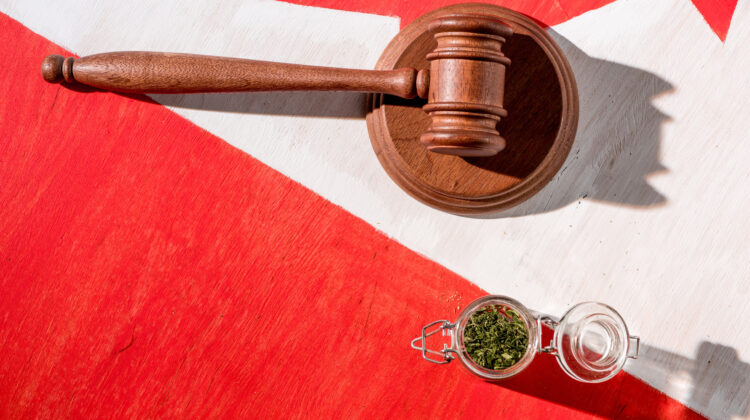
featured image courtesy of LightFieldStudios
In what feels like a never-ending saga, New York’s adult-use cannabis licensing program has once again been halted by the courts. On Thursday, Dec. 14, State Supreme Court Justice Sharon Graf issued a temporary restraining order that prevents the state’s Office of Cannabis Management (OCM) from processing thousands of pending business applications. This ruling halts the processing of both social equity applications and provisional licenses submitted last year. The decision affects hundreds of cannabis entrepreneurs in the state.
The court decision is the latest in a series of legal challenges that have plagued New York’s adult-use cannabis rollout. At the heart of the latest controversy is the state’s Conditional Adult Use Retail Dispensary (CAURD) program. The program prioritizes individuals with prior cannabis convictions and those from disproportionately impacted communities. But it has faced a series of legal challenges that have now culminated in this temporary halt.
The lawsuit from earlier this year—filed by Organic Blooms LLC, Niagra Nugget LLC, Blackmark LLC and Windward Management LLC—focuses on the claim that the OCM allowed certain CAURD applicants to bypass a crucial requirement that non-CAURD applicants were required to meet. These applicants argued that the OCM unfairly allowed CAURD applicants to move forward with their applications, despite not having a “municipally noticed secured location”—a key requirement for other applicants.
What Did the Judge Rule?
Judge Graf’s decision to issue a temporary restraining halts the processing of around 340 pending CAURD applications and provisional licenses submitted in December 2023, MJBizDaily reports. The OCM now cannot process applications from businesses that failed to submit proof of a municipally-secured location by Nov. 17, 2023, effectively freezing a large swath of the licensing process.
The ruling follows a complaint from four plaintiffs—business applicants who complied with the location requirement. They argued that the OCM’s decision to allow CAURD applicants to bypass this requirement unfairly disadvantaged their chances of securing a location. The judge agreed, noting that allowing CAURD applicants to submit a secured location after the fact could potentially disrupt or invalidate the secured locations of other applicants, reported Harris Beach.
In essence, the court’s ruling cites consistency in the licensing process, and the OCM cannot create an unfair advantage for one group of applicants over another.
What Does This Mean for Entrepreneurs?
The decision is a major blow for many entrepreneurs in New York’s budding cannabis market. Osbert Orduña, a service-disabled veteran and CEO of The Cannabis Place, expressed his frustration over the injunction. In a statement to MJBizDaily, he called it a “frozen in place” moment for many applicants, especially those who were waiting for the OCM to begin processing the applications submitted during the December 2023 queue. Orduña said he was already “not happy with the way the OCM process was moving,” and described the decision as “beyond disappointing.”
While some operators were able to secure licenses and open dispensaries, many others are now in a state of uncertainty. This includes applicants who spent months, and in some cases years, securing a dispensary location, lining up investors, and navigating the complex application process. With the OCM now unable to process applications, it effectively stalls all those efforts for the time being.
This isn’t the first time that legal delays have complicated New York’s cannabis rollout, either. A combination of lawsuits, regulatory missteps, and a robust illicit market have bogged down the industry. These legal challenges have cast a shadow over what many initially hailed as a model for equitable cannabis reform, frustrating many who were hoping for a smooth, streamlined process.
A Moving Target
The legal drama is far from over. Judge Graf’s ruling is only temporary, and the OCM must respond by Dec. 18. In the meantime, cannabis entrepreneurs who had their hopes set on a provisional license remain in limbo. For many, this delay is more than just a minor inconvenience—it’s a significant roadblock in their efforts to launch and grow their businesses.
This isn’t the first time that legal challenges have stalled New York’s cannabis rollout, and experts predict it won’t be the last. Jeffrey Hoffman, a cannabis attorney in New York, predicted this outcome early on, emphasizing that New York’s regulatory approach continues to face significant hurdles that slow progress and create uncertainty for both business owners and consumers alike.
Frustrations with New York’s cannabis program are mounting. As Ryan J. McCall, a cannabis attorney based in Albany, pointed out, businesses that have invested significant capital and time into securing locations have seen their plans thwarted by a regulatory system that continues to change the rules mid-game.
With thousands of applications now frozen in place and no clear resolution in sight, many entrepreneurs are facing an uncertain future. As the state continues to grapple with lawsuits and regulatory issues, the question remains: will New York’s cannabis industry ever achieve the smooth, equitable rollout that was originally promised?
For now, cannabis applicants and industry observers are watching closely as the legal battle continues and hoping for a resolution that will allow the market to move forward. But with every new setback, the dream of a thriving, inclusive cannabis market in New York seems just a little bit farther out of reach.



Leave a Reply